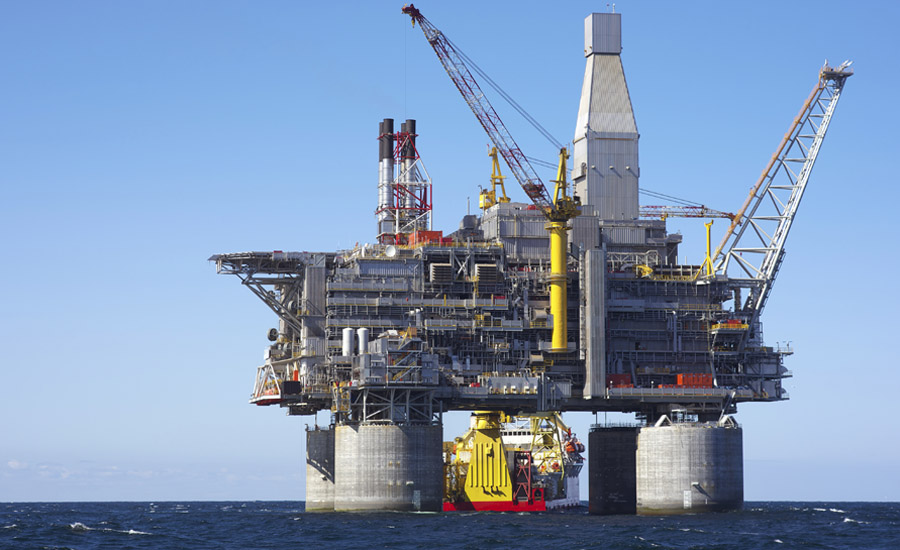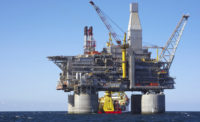Oil rig life - What's it like living on an offshore oil platform?

Posted with permission from NES Global Talent:
Oil rig fast facts
- There are around 1,470 offshore oil rigs around the world, which means this role could take you anywhere from the UK to Australia or even the Gulf of Mexico or the Middle East
- At any one time you will find nearly 200 people living and working on a rig
- You’ll rarely find a window inside
- Be thankful we’re not in the 70s – Before onboard wifi, engineers were restricted to just one phone call a week, and even that was capped to just six minutes
International engineering jobs require travel to some of the most remote places on earth, including oil rigs in the middle of the sea. You'll work hard offshore but be well rewarded for it - for a start, there's no cooking or cleaning to be done...
What job-related training will I need to work on an oil rig?
This isn’t your usual “stuck in rush hour" commute; a helicopter transfers you from the shore to the rig which in itself can be an invigorating experience. Offshore engineers are given complete sea survival training prior to this flight. Watch a video of an offshore engineer commuting to an oil rig to see for yourself.
Oil rigs are full of combustible materials and heavy machinery. As an offshore worker, you will benefit from plenty of training to ensure best practise at all times
Before starting your offshore life, you will also undergo a medical examination to make sure you’re suitable for work on a rig. There are first aiders and medicinal personnel on-board, with helicopters on standby for quick medical evacuations to the shore if necessary.
How many hours will I work on an oil rig?
The usual working shift is 12 hours ‘on’ and 12 hours ‘off’, and many shift patterns are a mixture of both day and night because operations run around the clock with no rig ‘downtime’. Many offshore jobs require shift patterns of 2 or 3 weeks on the rig / 2-3 weeks onshore, but the patterns can be longer.
What will my offshore accommodation be like?
Offshore installations have a dedicated team of kitchen staff who prepare food around the clock, often with a self-service style canteen. Despite the offshore location, fresh food is shipped in regularly, meaning you’ll have plenty of access to fresh meat, fruit and vegetables.
Oil rigs are close-knit communities and you can expect to share your room with several other engineers, although some oil rigs do offer private rooms. Showers and toilets tend to be shared among a couple of cabins, but most bedrooms do offer a washbasin, and a television.
How will I stay in touch with my family if I have a job overseas?
Far out at sea, mobile phone signal isn’t particularly reliable! However, larger oil rigs will have internet connections enabling Skype and other messaging services for uninterrupted communication with those back home, ensuring you’ll be on hand to help celebrate important occasions from afar. We’ve taken a look at some fantastic apps to help you stay in touch with your loved ones whilst on assignment.
Life is never boring on an oil rig
All offshore rigs have good recreational facilities to keep on-board staff entertained when not on shift, whether you’re in drilling, the roustabout team or a derrickhand. From small movie theatres and pool tables, to air hockey, large screen TVs and video game consoles you won’t be bored! Of course there’s also Wi-Fi do you can watch your own shows, but living in such close quarters you’ll find you quickly become a close-knit member of the team.
Keeping an oil rig operational for 24 hours a day means that it’s crucial for offshore personnel to be at the top of their game at all times; generally alcohol and non-prescription drugs are completed banned. Too keep everyone on board safe, smoking is allowed in designated areas with matches available as the source of ignition – these locations are far away from the most sensitive machinery.
What salary and benefits can I expect offshore?
Offshore jobs pay differently depending on your experience and role, however rig engineers can expect to be paid well due to a combination of the specialised skills required, the risks associated with working on a rig, and the personal sacrifices made in terms of working hours and not seeing family.
The oil and gas professionals that we work with love how we value our contractors on a personal level and take care of all assignment support needs, such as organising contractor travel and work permits, giving you peace of mind that you’ll be taken care of when working with us.
Fancy experiencing life on an offshore oil rig for yourself?
Search our available offshore vacancies.
Looking for a reprint of this article?
From high-res PDFs to custom plaques, order your copy today!







